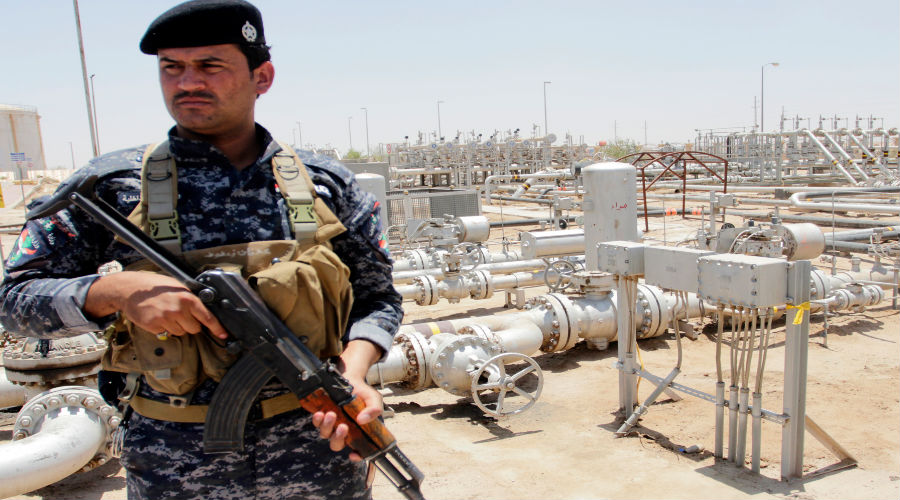The Iraqi government prioritizes rehabilitation of the oil sector in northern provinces, especially after it regained control of oilfields in Kirkuk and Mosul and forced out the Kurdish Peshmerga in mid-October 2017. The government also plans to sign contracts with foreign companies to double production in northern Kirkuk and seeks to rehabilitate a pipeline between Kirkuk and the Turkish port of Ceyhan, that was massively damaged by several attacks in the past two years. However government efforts are facing several challenges.
Quick Measures
On October 17, the Iraqi government forces took control of Bai Hassan and Avana oil fields in northwest Kirkuk after the Peshmerga withdrew from the area, and seized the Baba Gurgur, Jambur, Khabbaz fields, as well as the Ain Zalah field in Mosul. The development caused fluctuations in oil production and exports in Iraq’s northern region, and in Kurdistan in particular. Production fell from 600,000 barrels per day (bpd) to the current average of 300,000 bpd, due to difficulties in Kirkuk as well as in Kurdistan.
This prompted the Iraqi government to take quick measures to increase production and exports in the northern provinces, including Kirkuk. These include contracts with foreign companies to develop fields. The ministry of oil held talks with BP to help the North Oil Company double production in northern Kirkuk to over one million bpd.
The government is also making efforts to rehabilitate the Kirkuk-Ceyhan pipeline, which was shut down in 2014 after a string of attacks by ISIS forcing the government to use a pipeline from Kurdistan territory to Turkey. Three Iraqi state-owned companies, the North Oil Company, the State Company for Oil Projects (SCOP) and the Oil Pipelines Company - Iraq (OPC) will take part in the rehabilitation work in the coming period.
Different Considerations
The Iraqi government’s prompt action to develop rehabilitation plans for the country’s northern oil fields can be explained by the following factors:
1- Emphasis on Sovereignty: Because it was not content with previous frequent warnings that no oil deals can be made with the Kurdistan Regional Government independently of Baghdad, the Iraqi central government was quick to call upon states and foreign oil companies to pump investment into the development of Kirkuk oil fields. The move seeks to reassert its territorial sovereignty over the north and its oil resources. In its view, this would establish political and security stability in the coming period after its success in driving ISIS militants from these areas.
2- Increasing Oil Exports: Regaining control of Kirkuk fields is likely to boost the oil ministry’s plans to increase production and exports in the coming period. In October, the ministry announced that it hopes to raise its exports through the pipeline to their previous level of between 250,000 and 400,000 bpd from the current level of 150,000 bpd. Increased oil export revenue would help alleviate strong financial pressure aggravated by the sharp fall of oil prices in 2014 and the need to import oil derivatives at a huge cost estimated at US$ 2 billion a year due to massive damages at Baiji refinery, Iraq’s largest.
3- Reconstruction: The ongoing war on ISIS in northern Iraq launched in 2014 has caused massive damages to the country’s infrastructure and economy. The oil sector in particular suffered an estimated $15 billion in losses, of which $10 billion at Baiji refinery alone. The resulting significant need for oil derivatives to power water and electricity plants in northern Iraq forced the Iraqi government to rely on oil exports to meet domestic demand.
Obviously, the much-needed rehabilitation of oil infrastructure, including refineries, is a significant factor in plans for reconstruction of Iraq’s northern regions and the revival of various economic sectors. Moreover, the rehabilitation of the Kirkuk-Ceyhan oil pipeline will be a necessary step towards guaranteeing a smooth flow of oil exports from Kirkuk to the outside world.
Existing Challenges
Despite these plans, the Iraqi government’s current efforts may face multiple difficulties.
Firstly, the political and security situation in Kirkuk continues to be vague. Although the Iraqi government forces retook control of all oilfields, is not clear yet whether Kirkuk oil resources will be under the full control of the Iraqi authorities or a joint Iraqi-Kurdish administration, as offered by Prime Minister Haider al-Abadi in September after a referendum for secession from Iraq was held by the Kurdistan Regional Government.
The second challenge is the Iraqi government’s declining ability to persuade foreign companies into investing in Kirkuk and other northern regions amid escalating security tensions, exacerbated by the vague relationship between the central government and the KRG. This forced US oil company Chevron last month to temporarily suspend oil and gas drilling activity in Kurdistan on October 19.
The third challenge is a possible lack of funds for rehabilitating oil infrastructure and reconstruction amid declining export revenue and the high cost of the war on ISIS. Despite an international interest in funding Iraq’s reconstruction plans, the deteriorating security situation in the country can deter a majority of international partners, including world powers and international organizations, from funding and implementing reconstruction projects in partnership with the Iraqi government.
In light of this, it can be concluded that the success of the Iraqi government in achieving its goal of rehabilitating the oil sector in northern region in the near future remains uncertain, a possibility that will not only slow down oil production but will also impact reconstruction in general.


